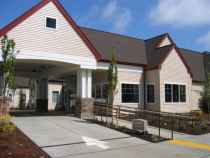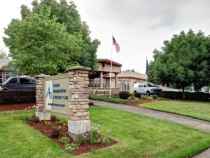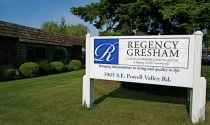Memory Care in Oregon
Alzheimer's is a growing concern in Oregon, where approximately 69,000 people aged 65 and older lived with the disease in 2020. Projections estimate that by 2025, 84,000 seniors in the state will have Alzheimer's. In 2015, there were almost 1,500 emergency department visits per 1,000 individuals with dementia, and an 18% hospital readmission rate. That same year, there were 1,652 Alzheimer's-related deaths, making it the sixth-leading cause of death in Oregon.
Fortunately, there are many memory care facilities across Oregon that provide quality care for those living with dementia. These communities offer around-the-clock supervision, structured activities and routines, and individualized care. Staff is highly trained in caring for seniors with dementia, and facilities have security features to prevent residents from wandering. The average cost of memory care in Oregon is $5,624, which is $560 more than the national average of $5,064.
This guide aims to educate families and individuals about memory care in Oregon, including the average costs, available financial assistance, free resources and state regulations governing memory care facilities.
SeniorAdvice's Guide to Memory Care in Oregon
Oregon has a SeniorScore of 69, which is three points lower than the national average of 72. The SeniorScore compiles over 100 data points to rate the suitability of a location for senior living. The SeniorScore is divided into four categories: Health & Safety, Recreation & Leisure, Finances and General Quality of Life.
Oregon has a diverse landscape, with mountains, oceans, valleys and high desert regions scattered across the state. This diversity makes for a robust outdoor lifestyle, which is perhaps one reason why Oregon scored the highest in the Recreation & Leisure category with a 64. The state has 193 golf courses and a high number of municipal parks.With a larger percentage of seniors than the U.S. average, 35% in Oregon vs. 29% nationally, older adults in the state have more opportunities to interact with their peers.
Oregon scored 63 for Health & Safety, with a high number of senior living facilities and Medicare-registered healthcare providers. The state also has an average number of hospitals, including the nationally-ranked OHSU Hospital. Life expectancy is slightly longer in Oregon than the national average, and seniors in the state can expect to live to about 80 years.
Oregon received the lowest score of 55 for Finances. Property and state income tax rates are both significantly higher than the national averages. Assisted living, memory care and nursing home costs are also very high compared to national figures, while household incomes are the same or only slightly higher than the national norm. Oregon's overall cost of living is also higher than the U.S. average.
Top Memory Care Communities in Oregon
Avamere Rehabilitation of Hillsboro is a 100 bed skilled nursing facility located in Hillsboro, Oregon. The facility is in a generally middle income area, with an average family income of $58,285. It is heavily populated, with approximately 46,000 ...
Located within the Vose neighborhood of Beaverton, Oregon, Avamere Rehabilitation of Beaverton is a 104 unit skilled nursing facility. The facility is in a generally middle income area, with an average per-household income of $51,435. With around 30,000 ...
Situated within the Larkspur neighborhood of Bend, Oregon, Bend Transitional Care is a 40 bed senior community. With a median family income of $58,077, the community is in a mostly middle class area. It is heavily populated, with ...
The Pearl at Kruse Way is situated within the Holly Orchard area of Lake Oswego, Oregon. It is a 45 room senior care community. The encompassing area is densely populated, with around 25,000 individuals residing in the zip ...
Marquis Mt Tabor Post Acute Rehab is located within the Mount Tabor neighborhood of Portland, Oregon. It is a 175 bed skilled nursing facility. With a median household income of $56,872, the facility is in a generally middle ...
Avamere Rehabilitation of Oregon City is located at 1400 Division St in Oregon City, Oregon. It is a 111 bed skilled nursing facility. The surrounding area is densely populated, with around 52,000 individuals living in the 97045 zip ...
Marquis Tualatin Post Acute Rehab,Rehab,Long Term Care is located close to the Rosewood area of Tualatin, Oregon. It is a 54 unit nursing facility. With roughly 28,000 residents in the zip code of 97062, the surrounding area is ...
Mirabella Portland is located within the Corbett-Terwilliger-Lair Hill neighborhood of Portland, Oregon. It is a 44 unit senior housing community. With around 15,000 individuals living in the 97239 zip code, the surrounding area has an average population density. ...
Avamere at Three Fountains is a 156 bed senior housing community. It is located at 835 Crater Lake Ave in Medford, Oregon. The facility is in a largely middle class area, with an average per-family income of $50,304. ...
Avamere Crestview of Portland is a 127 unit senior housing facility. It is situated within the Hillsdale neighborhood of Portland, Oregon. With roughly 16,000 individuals living in the zip code of 97201, the surrounding area has an average ...
Located within the West Beaverton area of Beaverton, Oregon, Maryville is a 155 room senior care community. The surrounding area has a dense population, with about 68,000 poeple living in the 97007 zip code. With an average ...
Avamere Riverpark of Eugene is a 119 room senior community located within the River Road neighborhood of Eugene, Oregon. The encompassing area has a dense population, with approximately 42,000 residents in the 97401 zip code. With an average ...
Sheldon Park Blue Harbor Senior Living is a senior housing facility situated within the Cal Young neighborhood of Eugene, Oregon. With around 42,000 individuals living in the zip code of 97401, the surrounding area is heavily populated. It ...
Laurelhurst Village Rehabilitation Center is located within the Sunnyside neighborhood of Portland, Oregon. It is a 179 bed nursing facility. The facility is in a primarily middle income area, with a median per-family income of $48,004. It ...
Avamere Rehabilitation of Eugene is a 123 room nursing care facility located within the Far West neighborhood of Eugene, Oregon. The community is in a generally middle income area, with an average per-family income of $50,779. It is ...
Located at 1023 6th Ave SW in Albany, Oregon, Timberview Care Center is a 97 bed senior care facility. With about 26,000 residents in the zip code of 97321, the surrounding area is densely populated. It is a ...
Located near by the Neighbors Southwest area of Tigard, Oregon, Avamere Rehabilitation of King City is a 148 unit nursing facility. The neighboring area is densely populated, with approximately 32,000 individuals residing in the zip code of 97224. ...
Marquis Centennial Post Acute Rehab is a 71 bed nursing facility located nearby the Centennial neighborhood of Portland, Oregon. With a median household income of $37,348, the facility is in a primarily middle class area. It is heavily ...
Regency Gresham Nursing and Rehabilitation Center is a 128 room nursing facility. It is located at 5905 SE Powell Valley Rd in Gresham, Oregon. The encompassing area is densely populated, with approximately 42,000 individuals residing in the zip ...
Robison Jewish Health Center and Adult Services is an 88 unit nursing care facility. It is situated in the Bridlemile neighborhood of Portland, Oregon. The community is in a mostly upscale area, with an average family income of ...
The Cost of Memory Care in Oregon
In general, memory care is typically 20%-30% more expensive than assisted living, but there's no current authoritative data for the exact average costs of memory care in any state. This level of care typically costs more due to its advanced safety measures, specialized programming and specially trained staff. In this guide, we estimated cost of memory care by adding 25% to the assisted living costs found in Genworth Financial's 2019 Cost of Care Survey.
Based on this calculation, Oregon has an average memory care cost of $5,624, which is more than the U.S. average of $5,064. Compared to the nearby Pacific Northwest states of Washington and Idaho, Oregon's memory care cost lies in the middle. Washington has the most expensive option at $6,875, while Idaho is less expensive, with a memory care cost of $4,660. Costs differ significantly in the neighboring states of Nevada and California. Nevada has the least costly memory care at $4,660, while California has an average cost of $5,625, which is almost on par with Oregon.
- Oregon: $5,624
- National: $5,064
- Nevada: $4,250
- Idaho: $4,660
- California: $5,625
- Washington: $6,875
The Cost of Memory Care in Oregon's Top Cities
Seniors who prefer to live in larger cities can expect to pay the most for memory care. Portland, the largest city in Oregon, has a memory care cost of $6,248. The state capital of Salem has the second priciest option at $5,344. Oregon's third-most populated city, Eugene, has a memory care cost of $5,406. Seniors who would like to save on memory care costs can opt for care in some of Oregon's smaller cities. Bend, located in central Oregon, has an average memory care cost of $5,249, while the southern city of Medford has the least expensive option in the state, with a cost of $4,938.
- Medford: $4,938
- Bend: $5,249
- Salem: $5,344
- Eugene: $5,406
- Portland: $6,248
Senior Care Cost Comparison in Oregon
Out of all the long-term senior care options in Oregon, memory care ranks as one of the pricier choices at $5,624 per month. This cost is second only to a semiprivate room in a nursing home, which comes in at $9,551 per month. Adult day care is the least expensive option at $2,167 per month. Assisted living, which offers the same amenities as memory care but without specialized services, costs an average of $4,499 per month. Home care options lie somewhere in the middle, with in-home care and home health care costing $5,148 and $5,339 per month, respectively.
- Memory Care: $5,624
- Assisted Living: $4,499
- In-Home Care: $5,148
- Home Health Care: $5,339
- Adult Day Care: $2,167
- Nursing Home Care: $9,551
Financial Assistance for Memory Care in Oregon
Oregon K Plan
Address: 500 Summer St. NE E-15, Salem, OR 97301
Phone Number: (503) 945-5600
Website: https://www.oregon.gov/dhs/SENIORS-DISABILITIES/KPLAN/Pages/index.aspx
The K Plan is a Medicaid state plan option for Oregon residents who need long-term care but want to remain in their community. Seniors can choose to receive services in a community-based care setting of their choice, such as assisted living or memory care facilities. The program covers daily activities, behavioral support and nursing services. To be eligible for this program, applicants must be an Oregon resident who's eligible for Medicaid, aged 65 or older, meet the income limits and require an institutional level of care.
Since this program is a Medicaid plan, seniors must apply for Medicaid before registering for the K Plan. They can apply through their local office.
VA Aid and Attendance Benefits
Address: 100 SW Main Street, 2nd floor, Portland, OR 97204
Phone Number: (800) 827-1000
Website: https://www.va.gov/pension/aid-attendance-housebound/
The Aid and Attendance benefit program provides monthly payments to veterans who qualify for or are receiving a VA pension. The funds received through the program can be used to help pay for memory care services. To qualify for the benefit, applicants must need assistance with daily activities, be bedridden due to a chronic illness, reside in a nursing home or be legally blind.
To apply for this benefit, seniors may either register in person at the nearest VA regional office or mail a completed VA form to their pension management center.
Oregon Memory Care Rules and Regulations
In Oregon, memory care communities can be licensed as assisted living facilities, residential care facilities or nursing facilities. They have to meet the licensing requirements in addition to memory care rules and obtain an endorsement on their license. These communities are regulated by the Oregon Department of Human Services (DHS) and must abide by state laws and regulations.
Scope of Care | Memory care communities provide the same services as assisted living facilities, such as assistance with activities of daily living, transportation arrangements, 24-hour care and access to a licensed nurse. Memory care facilities also must address the cognitive and physical needs of its residents with dementia. The community must provide daily structured and unstructured activities, sensory stimulation, and physical and outdoor activities. |
Care Plan Requirements | Seniors must be evaluated before their admission. A service planning team works with the resident and their family or health professional, if applicable, to come up with a service plan based on the resident's needs and preferences. The plan must include information about who will provide services and what, when, how, and how often they're provided. Memory care communities must also create individualized activity plans for each resident based on their activity evaluation. |
Medication Management Requirements | Facilities must have medication and treatment administration systems approved by registered nurses, physicians or pharmacist consultants. Direct care staff may administer medications, but they have to visually observe that the resident has taken the medication. Facilities must keep an accurate Medication Administration Record (MAR) of all medication, both prescription and over-the-counter. |
Staff Screening Requirements | Staff members of ALFs and memory care communities have to undergo a criminal record check. They must also be caregivers who can provide assistance with ADLs, medication administration, support and supervision. |
Staff Training Requirements | In addition to undergoing orientation, all direct care staff must complete preservice dementia training before providing care to residents. Pretraining should include: - Education on the dementia disease process
- Techniques for understanding and managing symptoms
- Strategies for addressing social needs
- Information on how to tackle the unique needs of residents with dementia
- How to ensure residents' safety
- How to provide care to residents with dementia
Direct care staff must complete an additional 16 hours of in-service training annually. |
Medicaid Coverage | Eligible seniors aged 65 and over who need memory care services may qualify for assistance through the Oregon Medicaid K Plan. |
Reporting Abuse | Anyone who witnesses or suspects older adult abuse can call the statewide reporting hotline at (855) 503-7233. Those with concerns of abuse or neglect at a memory care community can call the Community-Based Care Licensing Complain Unit at (844) 503-4773 or email a report to [email protected]. Oregon law protects the confidentiality of anyone reporting abuse. |
Physical Design and Safety | The physical environment and design of memory care communities must support its residents' needs, help promote independence and accommodate behavior related to dementia. Memory care communities must be safe, secure and meet the following requirements: - Be located on the ground floor
- Contain light fixtures that minimize direct glare
- Make use of windows and skylights to allow residents to experience the natural daylight cycle
- Have window coverings that minimize glare without blocking out the sunlight
- Have a low sheen or matte finish on floors, walls, ceilings and woodwork to reduce glare
- Have high visual surface contrasts to help visually impaired individuals distinguish the wall from the floor, door and other objects
- Feature a secure outdoor recreation area with a minimum size of 600 square feet of space
- Be protected by fences around the outdoor space that are at least 6 feet tall
|
Free Memory Care Resources in Oregon
Alzheimer's Association Oregon and SW Washington Chapter
The Oregon and SW Washington Chapter of the Alzheimer's Association services 38 counties and has offices in Portland, Eugene, Salem, Bend and Medford. The Alzheimer's Association is a trusted and reliable source of information regarding dementia and Alzheimer's disease. The organization provides care consultations, support groups and educational programs. It has a 24/7 helpline with clinicians and specialists who can provide advice and confidential support. The Alzheimer's Association also holds free creative arts programs and art gallery tours.
Long-Term Care Ombudsman
The Long-Term Care Ombudsman is an agency dedicated to helping Oregon's long-term care residents. The program investigates complaints, advocates for quality resident care and protects the individual rights of those living in long-term care facilities, including memory care communities. Its services are free, and ombudsmen are available to respond to any resident concerns, from medications to care plans.
Oregon Agencies
DHS Seniors and People with Disabilities
Address: 500 Summer Street NE, Salem, OR 97301
Phone Number: (503) 945-5600
Website: https://www.oregon.gov/dhs/seniors-disabilities/Pages/index.aspx
The Department of Human Services provides a wide array of services for seniors and people with disabilities that help maintain their independence. The government agency provides long-term care resources that include information on the types of care facilities and financial options available. Staff at local offices and community partners can help seniors and their loved ones find the services that meet their needs.
ADRC of Oregon
Phone Number: (855) 673-2372
Website: https://adrcoforegon.org/consite/index.php
The Aging and Disability Resource Connection of Oregon is a statewide resource managed by the Oregon Department of Human Services, State Unit on Aging. The organization helps individuals understand their options for long-term care and support. Seniors living with Alzheimer's have access to resources, services and trained professionals who can assist with their immediate needs or plan their future. If seniors need further assistance, options counselors can connect them with local resources best suited to their situation.
Area Agencies on Aging in Oregon
Oregon's network of Area Agencies on Aging offer community-based services. These agencies serve more than 90% of Oregon's seniors. Services offered include case management for Medicaid clients, social services, financial services and regulatory programs for elderly individuals.
Oregon Veterans' Affairs Department
The Oregon Department of Veterans Affairs helps those who've served in the military access state and federal benefits. Numerous resources help beneficiaries, their families and caregivers navigate through aging and disability. Available services include a representative payee program, Oregon veterans' long-term care homes, and assistance applying for pensions and disability programs to help pay for memory care services. To access benefits and other resources, individuals can contact their county's Veteran Service office.
Social Security Offices in Oregon
Social Security Administration offices in Oregon can help seniors access financial assistance programs. Seniors aged 65 and over may qualify for monthly Supplemental Security Income (SSI) payments they can put toward memory care. To be eligible for this program, applicants must be aged 65 or older, blind or disabled and have low income and few resources. Individuals who qualify for SSI can also apply for State Supplementation.
SSA office staff can also help seniors apply for State Assistance for Special Needs, where eligible applicants can receive funding to help cover various care needs, including the cost of community-based care facilities. To apply for these programs or check their eligibility, seniors can visit their local SS office.
Other Cities in Oregon






















 Your Information is Processing
Your Information is Processing